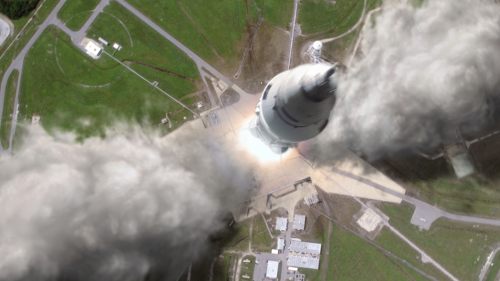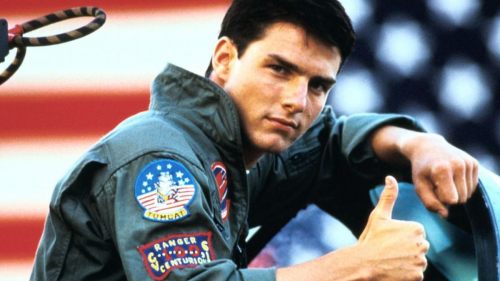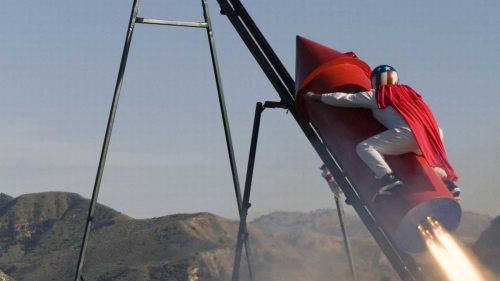In Defense Of Spielberg’s WAR OF THE WORLDS
You’d think we live in an era where bravura filmmaking is just flooding our movie theaters, judging by the way people react when you talk to them about Steven Spielberg’s War of the Worlds. The first half is incredible, they’ll say, but it falls apart after the Tim Robbins bit. As if 50 straight minutes of perfect, genius filmmaking is invalidated by 50 minutes of very solid, very good filmmaking.
Oh, and they hate that the son doesn’t die.
I’m here today to defend War of the Worlds, a movie that’s a minor entry in the Spielberg canon but that would be a major, career-defining work for almost anyone else. In 2005 it was a powerful reaction to the world post-9/11, but in 2013 it’s still a powerful reflection of living in a world where anything can go cataclysmically wrong at any time. It’s Spielberg’s ultimate statement on life in the 21st century, about living in an America that no longer feels secure. While the imagery of War of the Worlds is explicitly 9/11 related - Tom Cruise coming home from the initial attack covered in grey ash recalls the hordes of New Yorkers stumbling from the dust cloud of the World Trade Center collapse - the emotions continue to resonate in a world of super hurricanes and 9.0 earthquakes.
Casting Tom Cruise in the lead was a brilliant choice, as it allows Spielberg to again and again undercut and subvert our expectations. Tom Cruise has a movie persona that follows a fairly standard trajectory: he’s a hot shit guy who, over the course of the movie, learns humility and how to not be so selfish... while remaining hot shit. But in War of the Worlds Cruise's Ray is never hot shit. Not only is he a crummy dad right from the start, he’s blue collar in a most non-Cruise way. He’s living in semi-suburban New Jersey, for the love of God, living in a rowhouse in the shadow of an elevated highway. The casting of Cruise gives Spielberg a bit of shorthand - he was hot shit once, a decade or more ago, but that’s all over.
As the film goes on the Tom Cruise Hero’s Journey continues to be subverted. Instead of learning to be selfless, Ray learns the true meaning of selfishness, as applied to his family. The scene where Ray and his two kids, owners of one of the few working vehicles in the post-invasion landscape, drives right through a crowd of people to get to a ferry is powerful on many levels. Spielberg, an expert craftsman, makes the scene cinematically tense and terrifying, but it also disorients in a fundamental way - we’re rooting for our hero to blow past (and possibly through) other human beings in order to save his own family. Later he’s able to get his family on the ferry, but almost callously leaves behind his neighbor and her child.
Robbie, Ray’s son, is a stark contrast. He wants to join the army and ‘strike back’ at the Tripods. As the ferry takes off he runs to the ramp and begins to help people scramble aboard. Again and again he wants to make choices that would, in a standard action movie, be considered the heroic choices - but here they’re all the wrong ones. The image of Tom Cruise trying to hold Robbie down as he attempts to charge over the hill into battle is one fraught with years of pop culture weight - you’re seeing Maverick and Ethan Hunt trying to get someone to play it safe. For once you’re agreeing with cinema’s most self-centered star - sacrificing yourself for others doesn’t make a lot of sense in this situation.
That’s all first 50 minutes stuff, though. I doubt many of you will disagree when I say that the first half of War of the Worlds is some of the best cinema of the 2000s. The sequence where the Tripod first emerges from the ground is extraordinary in the way it communicates chaos and terror while still remaining coherent and visually accessible. The scene where Ray and his family drive away, Dakota Fanning's Rachel freaking out, with the camera swooping in and out of the van as they drive, is a masterwork, one of the rare show-off camera moves that feels like it’s servicing the emotion of the moment. Spielberg structures each set piece magnificently, and he stages each with an assured visual style. He is able to get across scale and confusion and chaos without resorting to shaking the camera or quick cutting; it's a pity that other filmmakers didn't look to this movie and realize you could impart visual information in action scenes while also creating a sense of urgency and fear and excitement. War of the Worlds is a masterpiece of modern action filmmaking.
There’s no reason to pretend the second half is as good as the first; it simply isn’t. There’s a jarring shift in pace; the movie had been going at full clip for so long that once it slows down for tension over terror audiences begin to fall out. But that shift in tone and pace reflects so perfectly the aftermath of a disaster that it’s hard to fault it; on first viewing it’s distracting, but on second and further viewings it seems only natural.
Allow me to interject here with a personal bit of history: I was in New York City on 9/11. I was supposed to be in an office building two blocks north of the World Trade Center when that first plane hit; I overslept and found myself at home in Brooklyn, panicked and unsure what was happening. All of my friends were in that building, and information was scarce and conflicting. I thought everyone I knew might well be dead. The subways were shut down, so I tried walking into Lower Manhattan; when I got to the Brooklyn Bridge I was faced with throngs of dead-eyed people, covered in dust, and cops barring my way. I ended up sitting on a curb next to a guy whose sister was in Tower One. We cried together.
Once the initial surge of panic wore off something worse crept up on me: dread. Were there more attacks coming? What was going to happen next? Tomorrow? The day after? I got this idea in my head that maybe the planes had plutonium on them, and that the entire New York City metropolitan area was now fatally irradiated. When I finally got in touch with my friends relief turned to exhausted anxiety. An attempt to give blood at the hospital - just something to do to feel like I was helping - was thwarted by the fact that the hospital didn’t need blood. There was a dividing line at the World Trade Center that day - either you survived or you didn’t. Very few people walked away seriously injured.
That afternoon we sat in my friend’s back yard, drinking beers and listening to the radio, trying to figure out what the hell had happened. The adrenaline that had kept us all going for hours left our systems, and we were sad and confused and frightened but so very tired.
Watching War of the Worlds again, the scenes in Tim Robbins’ basement - the sequence where most people agree the film falls apart - reminded me so powerfully of that afternoon. They’re the hours post-disaster when panic is replaced by a mixture of weariness and nihilism and an almost paradoxical will to survive. What makes War of the Worlds the most honest disaster film possibly ever is that it understands this shift in emotion and pace. This is when Cruise’s character finally takes two actions that could be construed as heroic, but both are fraught with darkness and other allegorical meanings.
The basement scene, by the way, has another extraordinary piece of filmmaking, but it is one that is slightly out of place in the larger structure of the movie. The scene where the alien probe begins poking around the basement is a meticulously crafted bit of tension, but Spielberg’s quoting of his raptors-in-the-kitchen sequence from Jurassic Park reveals the flaw - while tense and well-done, the scene leaves behind the grim realism of the first half for something more approximating a funhouse experience. Tom Cruise using a mirror to fool the probe is the first moment in War of the Worlds that shouts ‘This is a movie!’
Which is too bad, because the next moment returns us to the dire emotions of the rest of the film. Faced with Tim Robbins’ breakdown, Ray makes a shattering choice - to kill the man. Spielberg plays the entire scene off of a blindfolded Dakota Fanning, singing to herself a lullaby that bad dad Cruise didn’t know. All of the action happens behind a closed door; Spielberg specifically sets this up as a premeditated, cold blooded murder. There’s no shot of Robbins’ gun nut taking a first swing, there’s no moment where you could argue that Ray acts in self defense. The biggest action movie star in the world walks into a room and murders a man to protect his daughter.
That’s one of the most impactful moments of the film’s dance with selfishness. Cruise sacrifices part of himself, a piece of his soul, to protect his daughter. He’s behaving selflessly, but in the service of an ultimate selfish goal - the protection of his family. Again, with any other star this stuff would feel like standard survival storytelling, but placing Cruise in warps everything, like the gravity field of a black hole. Here’s Jerry Maguire learning that sometimes you have to murder.
The biggest heroic action Cruise’s character takes is, on the surface, very conventional. He allows himself to be captured by a Tripod in order to save his daughter. But at this point of the movie War of the Worlds has subtly changed from a 9/11 film to a War in Iraq film, with Robbins’ basement as the transition. Tom Cruise has morphed from 9/11 victim to insurgent, and his heroic action against the Tripod is dripping with meaning.
Tom Cruise becomes a suicide bomber. He finds a grenade belt, allows himself to be captured and then gets sucked into the Tripod’s interior, where he sets off the grenades. He survives because another captive - interestingly a soldier - helps him out, but it’s obvious that Ray’s plan is a suicidal one. He is going to give up his life so that his daughter can survive. And he’s going to do it in a way that has horrified Westerners since at least WWII, when Japanese pilots became kamikazes.
In many ways this is the most intellectually exciting part of the movie, and it also best represents what HG Wells was trying to say in his original novel (to which this film is, on the whole, remarkably faithful. We should note that in Wells’ book the crazed survivalist isn’t murdered, simply abandoned, making this vision much darker). Wells was writing at the height of British colonialism, and his Martian invasion was a brutal allegory for the way technologically advanced Brits would descend upon more primitive peoples and annihilate and enslave them. The Martian red weeds can be read as British culture spreading in occupied nations like India, trying to overtake the indigenous traditions. Wells’ argument is that colonialism is doomed to failure; even if the people themselves don’t rise up and defeat the invaders, the very environment itself will do so. Those weeds cannot take hold.
The suicide bombing scene also clearly explains what asymmetrical warfare is, and why it works. When attacked conventionally, the Tripods are invulnerable. But when approached with both subterfuge and a suicidal will, even the most invulnerable machine may be toppled. Spielberg deftly (maybe a little too deftly, as it seems people sometimes miss this point) puts us in the position of identifying with people who would lay IEDs and would strap explosives to their chests and walk into military bases. Who can fault Ray for his actions? How else can humans possibly hope to strike against the far advanced Martians? In this light, these actions are simply heroic, not the work of crazed terrorists.
After that it’s anti-climax, as the collapse of any great empire is. The British Empire just sort of crumbled over the years, and the American Empire is in the midst of a quiet death. Sticking with this ending, and playing it out the way the film does, is brave in the 21st century. American audiences don’t want their loud blockbusters to end quietly. They don’t want the enemies to be defeated without heroism. They don’t want the son to live.
And so we come to Robbie, and his ultimate survival, perhaps the most often used criticism of War of the Worlds. I’ve never had a problem with this turn of events, and I’ve never quite understood why others have; yes, the ending is a hopeful reunion, but considering the extraordinary darkness of the preceding 110 minutes, some hope is welcome. Robbie surviving doesn’t magically erase the fact that War of the Worlds is one of the scariest, most oppressively dark movies of Spielberg’s career, and perhaps the most extreme PG-13 movie of our modern era. It doesn’t remove the sheer terror of the initial Tripod attack, the moral confusion of the ferry scene or the sickening sweep of the river full of corpses.
The film is almost unrelentingly dark, and so when it finally does relent, right at the end, it feels good. Living through troubled times is tough, and the only reason we get up another day is the hope that things will get better. There’s no shame in War of the Worlds offering up a bit of that hope at the end of two desperate hours. It’s important to note that Spielberg gives us a modified version of the ending of The Searchers; Ray reunites with his son, but he never gets into the house. It’s more obviously happy than Ethan Edwards standing outside the house as the door closes, but there’s a reason why Spielberg ends the reunion in the street.
On a larger level Robbie has to live or everything Ray has done is negated. This isn’t a straight-up Tom Cruise movie, where he learns to be a ‘good parent.’ Spielberg, father to many, isn’t presenting a standard issue ‘dad learns a lesson’ film. The lessons to be learned as a parent are complex and sometimes contradictory.
As the movie begins Ray doesn’t know his son at all, and treats him like a child. He attempts to make a connection with Robbie by playing catch, a game for children, and Robbie is becoming a man. But Ray doesn’t get that; as an absent father he relates to Robbie based on an image years out of date.
That confrontation on the hill, where Robbie so desperately just wants to see what is happening, isn’t about Ray learning to let his son go. He never had his son at all. It’s about Ray understanding that his son is a man, and relating to him in that way. It’s also, in a circumspect fashion, about Ray finally taking responsibility for his child that is not yet grown up. Ray’s big argument to Robbie has been that he must stay for his sister, giving dad a buffer. In the van scene, where Rachel is flipping out, it’s Robbie who knows how to help her. Ray doesn’t know that she’s allergic to peanuts. He can’t keep her from seeing the corpses on the river. He’s ineffectual as a father to her, and he tries to make Robbie act as the surrogate dad.
As Ray has Robbie pinned, he sees another couple trying to take Rachel away from the scene of chaos. Spielberg is careful to show us that these are good people - there’s no question from their brief screentime that this couple would take care of Rachel. Better care than Ray, most likely. At that moment Ray has to make a choice, and he chooses to remain Rachel’s father. Part of that choice is allowing Robbie, as a man, to do what he has to do.
If Robbie died that would make Ray’s choice a terrible one. If Ray had saved Robbie from death, we could rest assured that Rachel was at least with decent people, and might very well have found her way home. At the very least it seems plausible she could have survived a couple more days until the Martians were killed.
Some might argue that a terrible choice would be more realistic, but when is it enough? When is everything ugly enough? When do we get a moment of relief? Ray’s decision is simply the right one, and for him to be punished for it would be far too grim at that point in the movie. Ray and Rachel arriving in Boston and having to explain to the mother that her son is dead would have ended the War of the Worlds on a note so dark it would render the entire movie a glum slog.
There’s nothing wrong with a certain amount of happiness in an ending, especially when it’s earned. And anyone who can watch the first Tripod attack, the shooting at the ferry, the murder of the survivalist, the burning train, people drowning in their cars when the ferry is capsized, humans being turned into mulch, watch all of these things and claim that War of the Worlds didn’t earn its small bit of happiness possesses a darker heart than I.



